|
|
|
Sort Order |
|
|
|
Items / Page
|
|
|
|
|
|
|
| Srl | Item |
| 1 |
ID:
171539
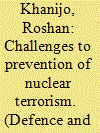

|
|
|
| 2 |
ID:
170664
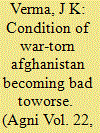

|
|
|
|
|
| Summary/Abstract |
The economic condition of war-torn Afghanistan is deteriorating
and the country, besides terrorism, is also facing drought. The
basic objective of the US is of “preventing any further attacks
on the United States by terrorists enjoying safe haven or support in
Afghanistan.” President Trump wants to withdraw US troops from
Afghanistan because of domestic compulsions. He appointed
Ambassador Zalmay Khalilzad as a special representative for this
purpose. When negotiations were in the final stages, President Trump
had to withdraw his plan because the Taliban carried out a terrorist
strike in which an American soldier was killed. However, in the last
week of November 2019, Trump visited Afghanistan and announced
that negotiations with the Taliban to restore peace will resume shortly.
Pakistan wants to install a puppet regime in Afghanistan; hence the
ISI is assisting several terrorist outfits in the country. The ill equipped
Afghan National Defence and Security Forces (ANDSF) are in no
position to fight the diverse terrorist organisations active in the country.
Both Al Qaeda and the Islamic State want to establish a stronghold
in Afghanistan. The Islamic State has created the Islamic State of
Khorasan Province (ISKP) and propagates that it wants to set up an
Islamic State where Sharia law would be imposed. The rule of Al
Qaeda or the Islamic State will be detrimental to world peace, hence
all regional as well as global powers should chalk out a detailed plan
so that both these terrorist organisations are defeated in Afghanistan.
The world powers should train and equip the Afghan security forces
so that they can fight the terrorist outfits and establish peace and
tranquility in the country.
|
|
|
|
|
|
|
|
|
|
|
|
|
|
|
|
| 3 |
ID:
124877
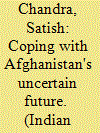

|
|
|
|
|
| Publication |
2013.
|
| Summary/Abstract |
India has, over the last decade or so, been a bit player in Afghanistan, and its influence on political developments there has been marginal. Accordingly, it has been on the fringes of international consultations on Afghanistan. It is not surprising, therefore, that its bitter opposition to talks with the Taliban was ignored. In comparison, Pakistan has been a much more important player and exercised far more influence than India at regional and international fora in the evolution of policies pertaining to Afghanistan. This is partially explicable by Pakistan's extensive border with Afghanistan, age old tribal links, deep rooted linkages with the Taliban, the Haqqani group and Al Qaeda, and a long and tortured history of incessant interference in that country. India's comparative lack of influence is due to the fact that though it has been proactive in bilateral diplomacy vis-à-vis the government of Afghanistan, it has been relatively inactive in reaching out to all shades of opinion in that country, maintaining close contacts with all key external players, and devising innovative and workable strategies for restoring peace and tranquillity in Afghanistan. It is time that India sheds its comparatively reticent posture on Afghanistan and becomes more involved on issues relating to developments there, as otherwise Pakistan will retain its dominant influence, which will obviously work to our detriment.
|
|
|
|
|
|
|
|
|
|
|
|
|
|
|
|
| 4 |
ID:
114446
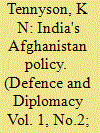

|
|
|
|
|
| Publication |
2012.
|
| Summary/Abstract |
Afghanistan is India's most important neighbouring country, with
which India has shared strategic, economic and political interests for
centuries. However, India-Afghanistan relations officially began only
after India's independence, more specifically after the signing of the
Treaty of Friendship between the two countries on January 4, 1950. As
early as March 22, 1949, Jawaharlal Nehru, the first Prime Minister of
India, emphasising the geo-political importance of India's neighbouring
countries (including Afghanistan) for India's foreign policy, remarked
during his lecture at the Indian Council of World Affairs (ICWA),
New Delhi, "[T]he nearby countries always have a special interest in one another and India must, inevitably, think in terms of her relations
with the countries bordering her by land and sea…I would also include
Afghanistan, although it does not touch India's borders; Tibet and
China, Nepal, Burma, Malaya, Indonesia and Ceylon [Sri Lanka]."
1
Since
then, successive Indian leaders have taken great interest in the political
developments in Afghanistan and its neighbouring countries, because a
political crisis in the region, directly or indirectly, spills over to India and
affects its strategic and security interests.
|
|
|
|
|
|
|
|
|
|
|
|
|
|
|
|
| 5 |
ID:
122035
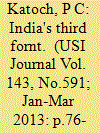

|
|
|
| 6 |
ID:
190008


|
|
|
| 7 |
ID:
139327


|
|
|
|
|
| Summary/Abstract |
Over the past 150 years, terrorist organisations around the world have adopted a similar range of core tactics to advance their cause, including the provocation of states into an overreaction to the threat posed by terrorism. In doing so, states fall into a deliberate trap set by the terrorists, with their own actions ultimately undermining their legitimacy to govern. Tom Parker argues that terrorist groups have been remarkably open and consistently candid about their intentions to capitalise on this weakness and that it is time that governments – and the societies they preside over – begin to benefit from their candour.
|
|
|
|
|
|
|
|
|
|
|
|
|
|
|
|
| 8 |
ID:
183989


|
|
|
|
|
| Summary/Abstract |
On 21 March 1968, nine months after the Six-Day War, the IDF launched a military operation against the Jordanian town of Karameh, which served as the headquarters of the Fatah terrorist organisation and a springboard for attacks against Israel. Yet rather than deal Fatah a crushing blow, the operation boosted its strength and prestige. Coming in the wake of the astounding June 1967 victory, the Karameh battle underscored the operational difficulties awaiting the IDF in its prolonged low-intensity warfare against non-state terror organisations.
|
|
|
|
|
|
|
|
|
|
|
|
|
|
|
|
| 9 |
ID:
159890
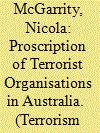

|
|
|
|
|
| Summary/Abstract |
Australia has a long history of legislation enabling the proscription of organisations which pose a threat to Australian security. Such laws are by no means a post-9/11 phenomenon. However, the proscription of organisations has assumed a particularly significant place in this country’s legislative response to the threat of terrorism since the terrorist attacks in New York and Washington. The focus of this article is upon the provisions of Division 102 of the Criminal Code Act 1995 (Cth), as it is this regime which has been most commonly relied upon in practice. Whilst the nature of the threat of terrorism faced by Australia has moved through several distinct phases, the basic structure of this regime has remained substantially intact. For that reason, although this article will canvass recent legislative amendments made in response to the foreign terrorist fighters phenomenon specifically, the aim is to provide a holistic picture of the form and substance of the proscription regime in Division 102. This builds upon the pre-existing scholarship in the field by carefully analysing the lessons which can be drawn from the now quite significant number of prosecutions for terrorist organisation offences.
|
|
|
|
|
|
|
|
|
|
|
|
|
|
|
|
| 10 |
ID:
159889
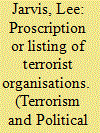

|
|
|
|
|
| Summary/Abstract |
This article serves as an introduction to this Special Issue on the banning or proscription of terrorist organisations around the world. It begins by arguing for greater attention to proscription powers because of their contemporary ubiquity, considerable historical lineage, implications for political life, and ambiguous effectiveness. Following an overview of the Issue’s questions and ambitions, the article discusses five themes: key moments of continuity and change within proscription regimes around the world; the significance of domestic political and legal contexts and institutions; the value of this power in countering terrorism and beyond; a range of prominent criticisms of proscription, including around civil liberties; and the significance of language and other symbolic practices in the justification and extension of proscription powers. We conclude by sketching the arguments and contributions of the subsequent articles in this Issue.
|
|
|
|
|
|
|
|
|
|
|
|
|
|
|
|
| 11 |
ID:
087386


|
|
|
|
|
| Publication |
2009.
|
| Summary/Abstract |
Terrorist organizations change over time because of processes such as recruitment and training as well as counter terrorism measures, but the effects of these processes have mostly been studied qualitatively and reductively. Seeking a more quantitative and integrated understanding, the author constructed a simple dynamic model where equations describe how these processes change an organization's membership. Analysis of the model yields a number of intuitive as well as novel findings. Most importantly, it becomes possible to predict whether counter terrorism measures would be sufficient to defeat the organization. Furthermore, the author can prove in general that an organization would collapse if its strength and its pool of foot soldiers decline simultaneously. In contrast, a simultaneous decline in its strength and its pool of leaders is often insufficient and short-termed. These results and others like them demonstrate the great potential of dynamic models for informing terrorism scholarship and counter terrorism policy making.
|
|
|
|
|
|
|
|
|
|
|
|
|
|
|
|
| 12 |
ID:
138033
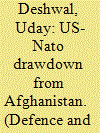

|
|
|
| 13 |
ID:
075043
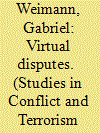

|
|
|
|
|
| Publication |
2006.
|
| Summary/Abstract |
Terrorists are using the Internet for various purposes. Most of the attempts to monitor and study terrorist presence on the Net focused on the practical and communicative uses of this channel by modern terrorists. Yet, not much attention has been paid to the use of the Net as a medium for terrorist debates and disputes. This descriptive article presents this less noticed facet of terrorism on the Net by providing examples of virtual debates among and within terrorist groups. The analysis of the online controversies, disputes, and debates may say a lot about the mindsets of terrorists, their motivations, their doubts and fears. In many ways, it allows the researcher to open a window to a world about which so little is known. It may also serve counterterrorism: by learning the inner cleavages and debates one can find practical ways to support the voices against terror, to broaden gaps within these dangerous communities, and to channel the discourse to nonviolent forms of action.
|
|
|
|
|
|
|
|
|
|
|
|
|
|
|
|
|
|
|
|
|